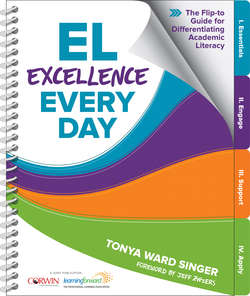Читать книгу EL Excellence Every Day - Tonya Ward Singer - Страница 39
На сайте Литреса книга снята с продажи.
4. Value “Errors” as Formative Language Data
ОглавлениеWhen students’ English use doesn’t sound or look right to you, be curious about the specifics. Be curious about what logical rules students may be applying from their first language. Why did the student make that language choice? Would that use of grammar or vocabulary make sense in the student’s primary language or dialect?
I put “error” in quotes for a very important reason: Error is a relative term. What sounds like an error in Standard English is often the result of students following the linguistic rules of their primary language. This is true whether a student speaks a language like Spanish, Chinese, or Arabic or a non-standard dialect of English.
When you hear an “error” or what sounds like an awkward use of English, reflect:
What can I learn from this about the language needed for success with this conversation task?
What can I learn from this about my students’ understanding of how to use language? Would that use of grammar or vocabulary make sense in the student’s primary language or home dialect?
How will I use these data to adjust my teaching? Will I provide one-on-one feedback or a whole-class mini-lesson in the moment? Will I adjust my scaffolds? Will I opt to change nothing in the moment (so critical thinking and risk taking get more emphasis than grammar in this task) and instead use these data to plan a follow-up language lesson to address this need?
If ELs use awkward grammar, is it because they are logistically applying a grammatical structure from their first language? Knowing this is powerful as it helps you validate what students know and teach clearly the difference between the two languages.
For example, when I lived in China, people would greet me with a question: “Ni hao bu hao.” The word-for-word translation is “You good not good.”
What?
“You good not good” sounds odd to my English ear for grammar. It is, however, logical and correct grammar in Chinese. If I translated “How are you?” word for word into Chinese, it would sound odd to a Chinese speaker.
Does this mean I have no concept of grammar? Not at all. I have a very strong sense of grammar from my first language and will keep applying those rules to every new language I learn until I see the clear difference and learn different rules.
If a Chinese-speaking EL spends some time with a bilingual dictionary, then says to me, “You good not good,” does the student understand grammar?
Yes. And the student also needs to learn the difference in English grammar for this context.
